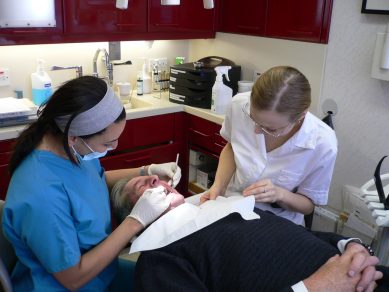Poorer People Have Worse Dental
 The poorer you are, the more likely you are to have problems with your
teeth and gums. That’s what Durham County Council’s cabinet will hear when it
meets on March 15th to discuss an oral health strategy for the next three
years.
The poorer you are, the more likely you are to have problems with your
teeth and gums. That’s what Durham County Council’s cabinet will hear when it
meets on March 15th to discuss an oral health strategy for the next three
years.
A report will be presented to the cabinet that will outline the steps the
council should take to reduce dental disease and improve oral health, especially
among young children and vulnerable groups.
Durham County Council’s cabinet member for adult and health services, Lucy
Howels, said, “Oral health is important in itself, but it also affects our
general health and wellbeing.”
“Poor oral health can affect someone’s ability to eat, speak, smile and
socialise normally, whether through pain or social embarrassment.”
“It is also clearly apparent that there are significant inequalities in
dental health, with people living in deprived communities far more likely to
suffer from tooth decay.”
“The strategy aims not only to improve overall dental health in County
Durham, but also to reduce inequalities, particularly among young children and
vulnerable groups.”
People living in poor areas tend to have worse dental health
The council’s oral health strategy has been drawn up by a steering group,
which includes members of the dental profession and paediatricians, as well as
representatives from the council and Public Health England. The strategy was
also developed via a process of public consultation.
Though the past 20 years have seen an overall improvement in dental health,
statistics from 2012 showed that nearly a third of England’s five-year-olds had
tooth decay.
There are widespread variations in County Durham, with regards to tooth
decay among young children. In the Woodhouse Close district of Bishop Auckland,
61% of five-year-olds have tooth decay. In contrast, only 6% of five-year-olds
in the Chester-le-Street South ward have this problem.
The evidence suggests that people living in deprived areas have
consistently worse dental health, as do vulnerable groups such as the socially
isolated, elderly and frail people, and those who suffer from physical or mental
disabilities.
The report will make several recommendations for improving oral health,
such as encouraging supervised brushing schemes and fluoride varnish schemes in
nurseries and primary schools.
1 Comments:
The issue is consent. I believe everyone should have a choice. Putting it in the public water supply is forced medication which is bad for some. Parents should stop giving sweets and sugary foods and drinks to their children. Fluoridation merely DELAYS the onset of dental caries in children who consume sugar.
By Not a child, at 11 December, 2017
Not a child, at 11 December, 2017
Post a Comment
<< Home